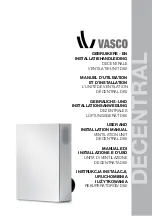
Operating elements
3
5
4
2
1
1 Control wheel
2 Handle, rear
3 Air outlet
4 Mains cable, not visible
5 Stand
Assembly
Carefully unpack the product and remove the packaging. Arrange the individual parts on a
clean surface and check that all parts shown above are present (refer to "Operating elements").
The stand consists of two parts. Three Phillips screws are included with the product to secure
the stand.
• Place the tower fan on a raised surface (e.g. a table) so that you can easily secure
the stand (5). If necessary, place a protective film or cloth underneath the tower fan to
protect the surface.
• Guide the mains cable (4) through the stand and clip the stand together. Ensure that the flat
side with the rubber feet is pointing downwards.
• Place the assembled stand onto the bottom of the tower fan so that the openings fit directly
on the cams and the screw holes on the tower fan. Ensure that the stand is level.
• Tighten the screws with a Phillips screwdriver.
• Guide the mains cable outwards from the middle of the stand. There are cable runs and a
cable opening on the bottom of the stand.
Operation
Place the fan with the stand (5) on a dry, clean, horizontal and secure surface.
Keep the fan away from devices that generate heat.
Do not place the product under vases or flowerpots to prevent water dripping
onto the product.
• The tower fan can be moved using the handle (2). Ensure that the tower fan is placed on a
flat and stable surface to prevent accidents.
• Ensure that the control wheel (1) is set to 0FF. Insert the mains plug into a suitable mains
socket.
• Set the desired fan speed using the control wheel. Air comes out of the air outlet (3) on the front
of the fan. The 1, 2 and 3 markings on either side of the control wheel indicate the fan speed:
1 = low fan speed, 2 = medium fan speed, 3 = high fan speed.
• The oscillation is also set using the control wheel. The arrow mark on the left-hand side of the
control wheel indicates the oscillating feature. Set the control wheel to the desired speed on
the left-hand side. The fan swivels left and right.
• If you do not want the fan to oscillate, set the control wheel to the right-hand side (no arrow
mark) and select the desired speed.
• Set the control wheel to 0FF to turn the tower fan off.
Maintenance and cleaning
• Turn off the fan before cleaning and remove the mains plug from the mains socket.
• Do not use any abrasive or chemical cleaning materials.
• Wipe the tower fan components regularly with a dry dustcloth.
• Never insert fingers, pens or other objects into the air grille to remove dirt.
• If you are not going to use the product for a long time, cover it and store it in a dry location
away from direct sunlight.
Disposal
Electronic devices are recyclable waste and must not be disposed of in the
household waste.
At the end of its service life, dispose of the product according to the relevant
statutory regulations.
You thus fulfil your statutory obligations and contribute to the protection of the environment.
Technical data
Operating voltage .................................220 – 240 V/AC, 50 Hz
Power consumption ..............................45 W
Protection class ....................................II
Oscillation range ...................................approx. 75 °
Cable length .........................................approx. 1.6 m
Air flow rate ...........................................approx. 1253 m³/h
Speed levels .........................................3
Operating/storage conditions ................-5 to +45 °C, 0 – 95 % RH
Dimensions (Ø x H) ..............................approx. 22 x 80 cm
Weight ..................................................approx. 2.5 kg
This is a publication by Conrad Electronic SE, Klaus-Conrad-Str. 1, D-92240 Hirschau (www.conrad.com).
All rights including translation reserved. Reproduction by any method, e.g. photocopy, microfilming, or the capture in electronic data
processing systems require the prior written approval by the editor. Reprinting, also in part, is prohibited. This publication represent the
technical status at the time of printing.
© Copyright 2015 by Conrad Electronic SE.
V1_1115_02-HK


























